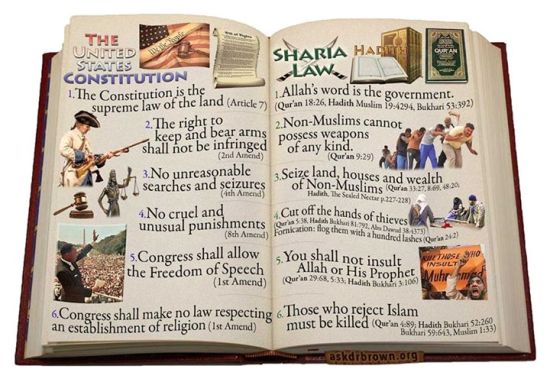Louis Palme
/
Sep 24, 2015
A firestorm has erupted in the 2016 US Presidential election campaign over whether a Muslim could become President. Technically, the answer is “yes” because the Constitution says there shall be no religious test for the office of the President. However, no practicing Muslim could honestly take the President’s oath of office, which says, “I do solemnly swear (or affirm) that I will faithfully execute the Office of President of the United States, and will to the best of my ability, preserve, protect and defend the Constitution of the United States." Here’s why:

Supremacy of the Constitution -- Article VI of the Constitution says that the Constitution and the Laws of the United States “shall be the supreme Law of the Land.” But Reliance of the Traveler, an accepted authority on Sharia Law says in paragraph a1.1, “The source of legal rulings for all acts of those who are morally responsible is Allah.”
Grounds for Impeachment – Article II of the Constitution says, “The President shall be removed from Office on Impeachment for, and Conviction [in a trial before the Senate] of, Treason, Bribery, or other high Crimes and Misdemeanors [based on U.S. law].” But in paragraph o25.3 of Islam’s Sharia Law manual, it says a Muslim ruler (caliph) becomes unfit for office if he 1) does not maintain the prescribed five daily prayers, 2) makes reprehensible innovations, or 3) approves laws that contradict Sharia Law. It goes on to say, “It is obligatory for Muslims to rise against him if possible, remove him from office [by force], and install an upright leader in his place.” Thus a Muslim ruler would be thrown out of office by his own people if he supports man-made laws that contradict Sharia Law. His deposers would be seen as heroes.
Constitution vs. Sharia Law – There are too many contradictions between the Constitution and Sharia Law to list all of them here. This Internet guide compares the U.S. Constitution with Sharia Law article-by-article: http://www.annaqed.com/en/islam-under-the-microscope/sharia-law-and-the-us-constitution Here are some of the more troubling differences – freedoms and rights protected by the Constitution but not by Sharia Law:
- Freedom of religion
- Freedom of speech
- Freedom of the press
- Freedom to dissent and to present grievances to the government
- The right to self-defense (to bear arms)
- The right to due process and a fair trial
- No cruel and unusual punishment
- No discrimination based on race, religion, or gender
Outrageous Islamic Duties of a Muslim Ruler (Caliph) – In paragraph o25.8 of Islam’s Sharia Law, a Muslim ruler must do the following things – all of which would outrage U.S. citizens:
- Protect the Islamic religion
- Lead the Friday prayers
- Engage in jihad (fight against Jews and Christians)
Taquiyya – Or Lying to Achieve Islam’s Goals -- Whether it involves taking the oath of office or just running the country, our President is expected to tell the truth. Two recent Presidents (Nixon and Clinton) faced impeachment for lying. However, Islam’s Sharia Law (paragraph r8.2) says that Muslims are obligated to lie if the goal of lying is obligatory under Sharia Law. The example given is to conceal a Muslim from an oppressor who asks where he is. “Whether the purpose is war, settling a disagreement, or gaining the sympathy of a victim [to prevent retaliation], it is not unlawful to lie when any of these aims can only be attained through lying.”
Muslim Jurists’ Respect for U.S. Laws -- Sixty percent of U.S. Presidents had law degrees, including our current President. So a 2008 religious edict (fatwah) issued by the Assembly of Muslim Jurists of America is relevant to a discussion about a possible Muslim President. This edict stated among other things: 1) Authority to legislate rests with Allah alone; 2) a Muslim judge must do everything in his power to enact laws that allow the Muslims to practice their Sharia; 3) Muslim judges are not permitted to take those jobs except to serve Islam and Muslims; 4) Muslims must judge by the rulings of Sharia as much as possible even if by ruse; 5) it is required for a Muslim to be hostile to courts which rule by man-made law and to dislike them; and 6) if you are wronged and demand your rights guaranteed by Sharia , you have no recourse but to go to man-made courts as long as you have hatred in your heart for the courts. (Source: www.translatingjihad.com/2012/03/assembly-of-muslim-jurists-of-america.html )
What About Moderate Muslims? -- Whenever the harsh demands of Islam’s Sharia Law are raised, someone always objects that millions of moderate Muslims do not practice them. However, a recent poll indicated that over half of American Muslims want to be able to practice Sharia Law here, and nearly twenty percent of them believe the use of violence is justified to make Sharia Law the law of the land. Meanwhile, moderate Muslims cannot change or cancel the provisions of Sharia Law. Islamic institutions and schools of thought preach strict adherence to Sharia Law wherever Muslims live. “. . there is no country on the face of the earth where a Muslim has an excuse to behave differently than he would in an Islamic country. . ” (Reliance of the Traveler, paragraph w43.5(c)) As millions of refugees flee Muslim-majority countries for the West, we must never let Sharia Law get a foothold here.
(Source: https://www.centerforsecuritypolicy.org/2015/06/23/nationwide-poll-of-us-muslims-shows-thousands-support-shariah-jihad/)
Disclaimer: The articles published on this site represent the view of their writers.